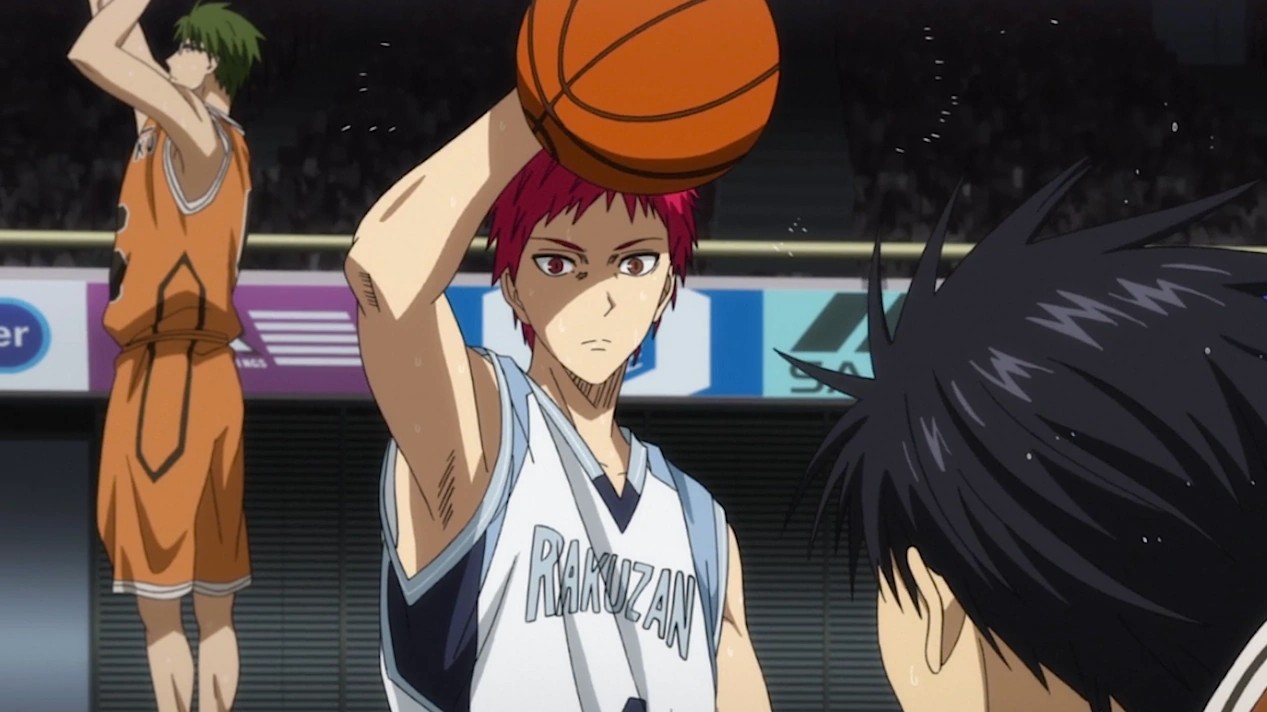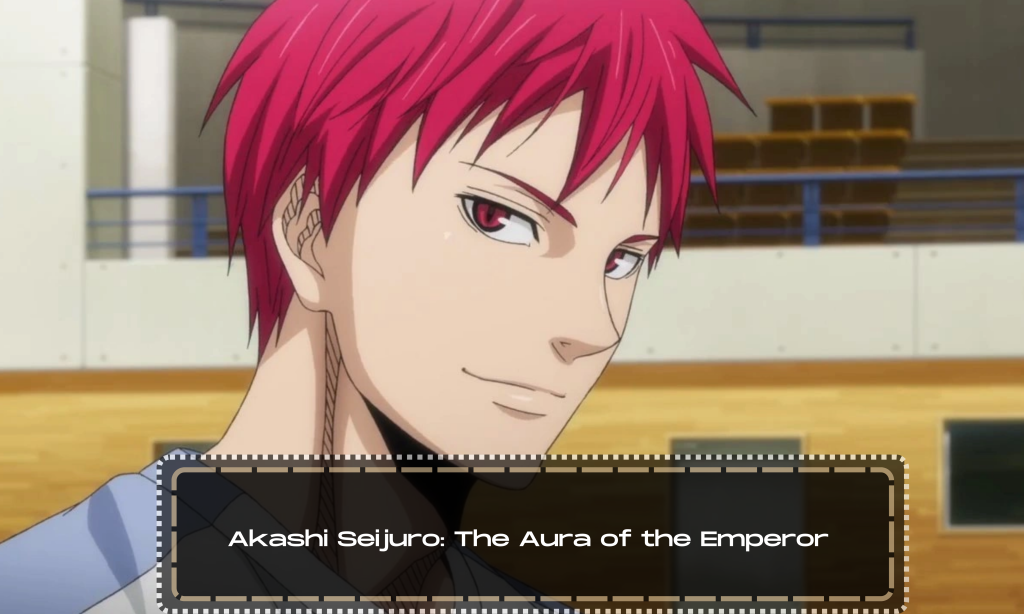Akashi Seijuro: The Aura of the Emperor

One of the truest forms of terror is a lack of autonomy. In other words – helplessness. A loss of control when it comes to your fate. An inability to do anything to combat a supreme opponent. We long for control of our own lives and of the situations that dictate these lives, so the idea that our future rests in the hands of someone who couldn’t care less is horrifying.
And tapping into that fear taps into the potential for a great antagonist. But it is key to note that this horror can only be as potent as possible with a narrative character design that compliments its story. And Akashi Seijurou has all of that in spades due to his ideals, his role, his themes, and how it all coalesces in his characterization.
As a child born to a household of great status and reputation, expectations were a part of Akashi’s life, in every regard, from the beginning. Sports, school, art. He grew up believing that winning in any context was everything – that losers will be denied of their desires and cursed to live an unfulfilling life.
This caused him to grow up with a fixation on victory, that he must win at all costs. It is not a very complex foundation for his beliefs, but it’s understandable and substantial, and it gets to the heart of the character and touts the importance of environmental factors in forming personal philosophies.
Despite the difficulties of his experiences, this didn’t become a pathologically unhealthy sort of philosophy until Akashi developed a second personality after his mother’s death. This persona was a radical, extreme extension of his original mentality, with a razor focus on dominance and winning. And whenever it took over, Akashi turned much more extreme, domineering and violent, becoming clouded in hubris.
He grew to believe that victory would always be his as long as he willed it, and in turn, he was willing to do anything to achieve this. In terms of his characterization, This leads to an Ominous aura.. one of mystique, unpredictability, and an understated but absolutely lethal brand of personal power. Akashi isn’t big or extremely fast or physically gifted.
His character design and behaviours are very efficient in displaying what he’s about – a slight and small frame, a nearly permanent, knowing smirk on his face, often playing chess or the violin – even without lines, the visuals make it clear that Akashi is a character of simplicity, intelligence, and confidence.
He’s a point guard, so the main attributes that he needs are technique, vision, intelligence, and control. And this last element is the characteristic that defines Akashi. He can control and dominate anyone and make them submit due to his supreme game sense, instincts, persona, and the habits he developed throughout his life.
And this dominance extends outside of the court too. His second personality manifested as a result of his fear of being left behind by the rest of the generation of miracles, and in response, he projects a personality that starkly compensates for this fear with a supremacy that never yields. his power is not primarily not in his strength, but in his commanding authority to see things that others can’t, to bend and break the will of those he opposes.
There’s a reason that he alone can control the strong personalities and carefree wills of the generation of miracles. He is an absolute leader of men for those he allies with, and a terror for the opponents. He doesn’t often tout his superiority because it’s plain for all to see, but when others continuously try to defy his absolute will, he feels the need to reiterate what is obvious.
And anyone who defies him is met with erratic and violent reactions, as Kagami experienced. It’s this outward assuredness that leads him to believe that winning is his god given right. He is absolute, and he will control everything to lead to his desired outcome. And if his teammates do not contribute or are detrimental to his goals, he’s as cutthroat as you’d expect.
But as cruel as it is, it’s an understandable and almost admirable level of conviction – Akashi essentially believes that he has no worth if he is not winning. People have different ways of classifying self-value, and he is no different. So when it comes down to it, is it really so hard to believe that he’d do whatever it takes to defend his identity and purpose? There are multiple forms of power, two of which apply here.
The first is the abstract perception of power – that someone can be given superiority simply due to others believing that they possess that superiority. The immaterial becomes material. This is very clearly the case with Akashi, stemming from his unique aura and gift for leading others. It is not power in a vacuum, but it becomes such when he can use this skill to cause others to follow or submit.
But his fixation with defending his identity cannot be fulfilled simply through the perception of power – it also requires what I refer to as a meritocratic power – simply, the ability to follow through with your words. To walk the walk. To defeat others due to superior ability. While Akashi is characterized by this aura that imbues him with a sense of abstract, innate power, he can prove it too, as shown when he put a leash on Murasakibara after defeating him.
This is a story with a huge focus on the dynamics of a might is right philosophy, and Akashi is a great display of that. But he doesn’t dismiss all of those without skill just because they are inferior to him – he respects it, to a certain level that falls just short of giving his worthy opponents a handshake.
Yet he speaks facts and is concerned with the harsh truths of the world, and while it may look at times like Akashi is flaunting his superiority, I believe that he is simply doing his opponents what he believes is the respect of telling them that their struggles are in vain. He just can’t comprehend the want to fight against a seemingly unscaleable obstacle.
He does not get the underdog mentality that characterizes a great deal of humanity. It’s an impressive sort of obliviousness that feeds into Akashi’s refusal to give up control and his focus on maintaining order. When the generation began developing, seeking new motivations and going their own ways, Akashi ensured that they would not disrupt the function of the team – because this would keep the dynamics predictable for him and provide the team with the best chance of victory.

He is somewhat in the vein of the Ruler archetype in both aspects of his personality, with common links between the two being his dislike of entropy, his absolute need to win, and his penchant for control. The difference is that his second personality is animalistic, and allows those desires to bubble to the surface and dictate his actions.
Ironically, throughout the majority of the story, Akashi is reliant and dependent on his primal wants as a sort of compensation, making him someone that isn’t truly internally strong in this state. His confidence is real, but it doesn’t have basis in stability. He’s tunnel-visioned: he believes he will always win, but he never thinks of the worst case, of the possibility of him losing.
His will is unbending but inflexible, and that is why he displays such fragility after Seirin pushes him to the brink. But he encapsulates the psychological concept of reaction formation, because despite his inner turmoil, the way all of this manifests completely eliminates any sign of weakness and gives us some who is secure and commanding.
And this makes for an excellent antagonistic force. Kuroko no Basuke is full of loud, colourful personalities and playing styles that give the story a very bold approach. From the egoistic angst of Aomine, the cold calculus and badassery of Midorima, the force-of-nature like brute strength of Murasakibara and the flamboyant yet extremely passionate Kise, this narrative cycles through mini antagonistic arcs with focuses on quote unquote villains who are extremely interesting focal points through very rule-of-cool, badass elements.
But Akashi contrasts this with his quiet control. Even his ability is understated – an instinctual game sense so good that it’s like he sees the future, a talent unrivalled, but one that refrains from exuberance. His playing style is simple, he has no need to prove anything, and his order is absolute. His talent and skill is terrifying, but it is not what defines him and leaves a lasting impact.
In a story about meritocracy, the ultimate display of power is from a character whose deadly threat is in his silent confidence, his composure, and his ability to control, both passively and forcefully. And that is truly terrifying. Many thanks for reading.
That’s me, Andreea Blaga, author of the blog anime-everything.com. I work as a content creator in the US. I am also passionate about Japanese Anime.


Related post
The Art Style of Solo Leveling: A Visual Feast for Readers
On this pageAkashi Seijuro: The Aura of the EmperorThe Art Style of Solo Leveling: A...
Oct
Why JJBA is the Most Bizarre Anime Ever Made
When discussing iconic anime series, one title that consistently stands out is “JoJo’s Bizarre Adventure,”...
Oct
The Impact of Wind Breaker on the Sports Anime Genre
The sports anime genre has seen numerous iterations over the years, captivating audiences with its...
Sep
Decoding the Enigmas: Exploring the Hidden Secrets of Gravity Falls
“Gravity Falls,” created by Alex Hirsch, is a beloved animated series that has captivated audiences...
Aug
The Rise of Kaiju No. 8: A New Era of Monster Manga
The world of manga has always been rife with innovative storytelling and vivid illustrations, but...
Aug
Character Study: Korra and Aang’s Legacy
In the richly woven tapestry of the “Avatar” universe, the characters of Korra and Aang...
Jul